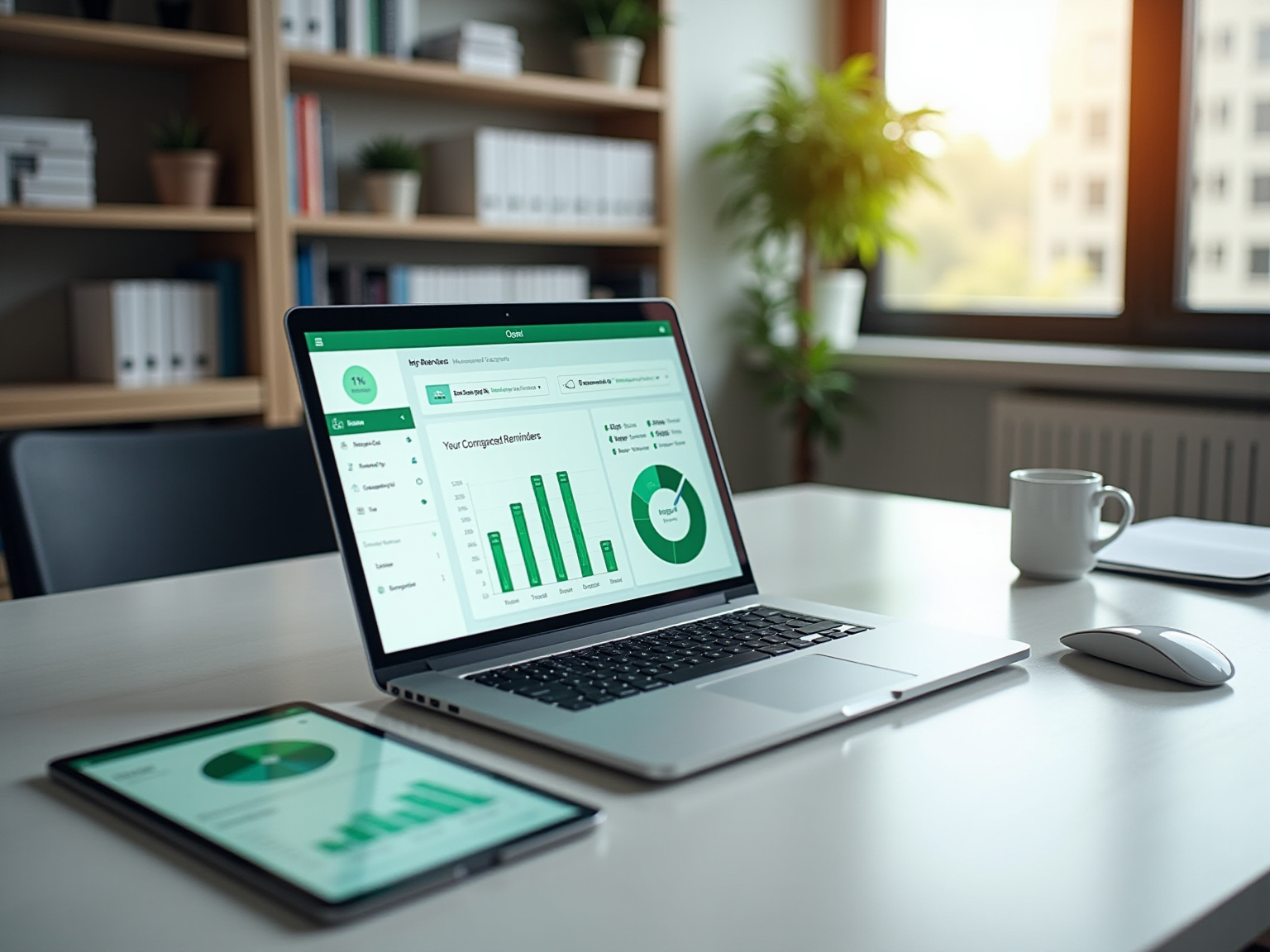Overview
Making Tax Digital (MTD) stands as a pivotal UK initiative that mandates accountants to maintain digital records and submit tax information electronically. This requirement significantly enhances accuracy and operational efficiency. Firms utilising MTD-compatible software experience remarkable advantages, including:
- A 50% reduction in response times
- Enhanced customer engagement
Consequently, MTD evolves into a strategic advantage for accountants, positioning them to thrive in an increasingly digital landscape.
Key Highlights:
- Making Tax Digital (MTD) is a UK government initiative aimed at modernising the tax system through mandatory digital record-keeping and electronic submissions.
- MTD enhances accuracy, minimises errors, and streamlines tax reporting, allowing accountants to improve operational efficiency and customer relationships.
- Statistics show that firms using MTD-compatible software experience a 50% reduction in response times and a 38% increase in engagement rates.
- Key compliance requirements for accountants include maintaining digital records, submitting quarterly updates, and using HMRC-approved software.
- Accountants should educate clients on MTD, assist with digital record-keeping, and monitor regulatory changes to ensure compliance.
- Preparation steps for MTD implementation involve evaluating the customer base, choosing user-friendly software, and providing ongoing support.
- Benefits of MTD for accountants include increased efficiency, enhanced customer relationships, improved accuracy, new revenue streams, and a competitive advantage.
- Early adopters of MTD can position themselves as market leaders, improving operational efficiency and customer loyalty.
Introduction
In the evolving landscape of accounting, the UK government’s Making Tax Digital (MTD) initiative emerges as a pivotal development, compelling businesses and accountants to adopt a digital-first approach. This transformation streamlines tax compliance while enhancing operational efficiency and client engagement. As firms navigate this new paradigm, the advantages of MTD become increasingly apparent, ranging from improved accuracy in reporting to the chance for accountants to redefine their roles as proactive financial advisors.
Statistics reveal significant reductions in response times and heightened client interactions, illustrating that the shift towards digital record-keeping transcends mere regulatory compliance; it represents a strategic advantage capable of elevating accounting practices to unprecedented levels.
Define Making Tax Digital (MTD) and Its Importance for Accountants
Making Tax Digital (MTD) represents a pivotal initiative by the UK government aimed at modernising the tax system. It mandates that businesses and individuals maintain digital records and submit tax information electronically. The significance of MTD for accountants is profound, enhancing accuracy, minimising errors, and streamlining the tax reporting process. By embracing a digital framework, financial professionals can markedly boost operational efficiency and cultivate stronger relationships with customers through real-time access to financial data and insights. This transformation not only simplifies compliance but also empowers financial professionals to act as proactive advisers in their customers’ financial journeys.
Statistics reveal that firms utilising software designed for MTD for accountants, such as Glasscubes, have achieved a remarkable 50% reduction in response times and a 38% increase in engagement rates, highlighting the efficiency gains linked to digital record-keeping. Furthermore, Sophie Montgomery from TaxAssist Accountants noted an impressive 288 hours saved in just one tax season, underscoring the tangible benefits of adopting MTD for accountants. Successful integration of MTD for accountants involves not just technical setup but also the adaptation of existing processes and comprehensive staff training. This proactive approach ultimately results in enhanced financial management and compliance with MTD for accountants. For instance, the integration of MTD-compatible software can optimise workflows and elevate customer engagement, making thorough preparation essential for firms.
The importance of MTD is further underscored by recent discussions at industry events like Accountex London, where pivotal topics included the impacts of digitalisation and AI on accounting practices. Insights from these discussions accentuate the necessity for financial professionals to stay ahead of the curve as they navigate the ongoing evolution of tax administration. By leveraging digital tax platforms, financial professionals can elevate their service offerings, ensuring they remain indispensable allies in their customers’ financial success. As we approach 2025, the criticality of digital record-keeping will only intensify, solidifying MTD for accountants as a focal point for accounting professionals.
Outline MTD Compliance Requirements for Accountants
To comply with Making Tax Digital (MTD), financial professionals must ensure that their clients utilise MTD-compatible software for effective record-keeping and tax submissions. The key compliance requirements include:
- Digital Record Keeping: Clients are required to maintain digital records of their income and expenses, which is essential for accurate reporting. Tools such as this streamline this process by offering a secure platform for users to upload and manage their financial information, guaranteeing that all communication is included within each audit request. This eliminates the confusion of duplicated requests and misplaced information often seen in email communication.
- Quarterly Updates: Taxpayers must submit their income and expense information every three months, promoting timely and organised financial management. Automated reminders from the system assist in keeping users on schedule with these submissions, greatly decreasing the time financial professionals spend pursuing overdue or absent items. As one user remarked, “The automated reminders have changed our workflow, enabling us to concentrate on advising customers instead of pursuing information.”
- End-of-Year Declaration: An annual summary must be submitted to HMRC, consolidating the quarterly data into a comprehensive report. The real-time reporting capabilities of the platform enable this consolidation, simplifying the preparation of precise submissions and ensuring visibility into audit processes.
- Software Compliance: It is crucial to use accounting software that is approved by HMRC for MTD compliance, ensuring that all submissions meet regulatory standards. The system is created to be entirely compliant, offering reassurance for financial professionals and those they serve.
- Customer Engagement: Accountants should proactively educate customers about MTD requirements and assist them in transitioning to digital systems, fostering a smoother compliance process. The platform improves customer interaction by streamlining communication and data collection, enabling financial advisors to concentrate on guiding their customers while ensuring prompt information submission.
Recent statistics indicate that a significant percentage of accountants are now using MTD for accountants software, reflecting a growing trend towards digital record-keeping. For example, companies that have implemented such solutions have reported a 50% decrease in customer response times and a 40% increase in customer interaction, demonstrating the effectiveness of these tools in achieving MTD compliance.
Expert opinions emphasise the importance of digital record-keeping for MTD compliance. Industry experts assert that keeping precise digital records not only streamlines the compliance process but also enhances overall customer engagement. By adhering to these requirements and utilising tools like Glasscubes, financial professionals can effectively assist their customers through the complexities of MTD while ensuring compliance with HMRC regulations.

Detail Steps for Accountants to Prepare for MTD Implementation
To effectively prepare for MTD implementation, accountants must adhere to the following steps:
- Evaluate Customer Base: Determine which customers will be affected by MTD based on their income levels and business structures, ensuring a customised approach.
- Choose MTD-Compatible Software: Opt for software that not only meets MTD requirements but also provides an intuitive experience for users, facilitating smoother transitions. This choice is crucial, as user-friendly software can significantly ease the adaptation process.
- Educate Customers: Organise training sessions or provide comprehensive resources to help customers grasp MTD and its implications, fostering a collaborative environment. As Caroline Hobden noted, “Adapting to a new way of working will be a smoother process by learning from and sharing insights with others.”
- Set Up Digital Record-Keeping: Assist individuals in establishing digital record-keeping systems that comply with MTD requirements, enhancing efficiency and accuracy.
- Implement Regular Cheque-Ins: Schedule periodic reviews with customers to ensure ongoing compliance and address any emerging issues, reinforcing accountability. Utilising Glasscubes’ automated reminder feature can streamline this process by sending timely reminders for cheque-ins. This feature enables unlimited reminders to be set at any frequency, ensuring that no individual is overlooked. You can customise messages to indicate urgency, which helps in meeting deadlines effectively.
- Monitor Changes in Regulations: Stay informed about any updates to MTD regulations and adjust practises accordingly to maintain compliance and customer trust.
- Ensure Adequate Support for Technical Issues: Recognise that technical issues may arise during implementation. Choosing software with strong customer support and establishing an internal support system can help address MTD for accountants challenges promptly.
By following these steps, financial professionals can adopt a proactive stance towards MTD compliance, minimising disruptions and strengthening client relationships. Notably, firms utilising effective software solutions, such as Glasscubes, have reported a 50% reduction in response times, underscoring the importance of choosing the right tools for successful implementation.

Explore Opportunities and Benefits of MTD for Accountants
MTD presents numerous opportunities and benefits for accountants, including:
- Increased Efficiency: By automating tax submissions and record-keeping, accountants can significantly reduce the time spent on manual processes. This transition enables them to concentrate more on advisory roles, increasing their worth to customers. Companies utilising this platform, for example, experience a 50% decrease in response times, demonstrating the efficiency improvements achievable with MTD. Steve, an audit manager, observed that Glasscubes has facilitated faster replies from customers, optimising the entire audit procedure and decreasing the time spent on pursuing information.
- Enhanced Customer Relationships: With real-time access to data, accountants can provide timely and relevant advice, which fortifies trust and satisfaction. This proactive strategy encourages deeper customer engagement and loyalty. Clients value the openness offered, enabling them to view outstanding queries and necessary information at a glance, which improves their overall experience.
- Improved Accuracy: Digital systems associated with MTD minimise human error, resulting in more accurate tax reporting and fewer discrepancies. This reliability is crucial for maintaining compliance and client confidence. The structured nature of this platform aids in guaranteeing that all essential information is readily available, minimising the chance of mistakes that may arise from extensive email threads.
- New Revenue Streams: The insights gained from digital records enable accountants to offer additional services, such as financial planning and advisory. This diversification can lead to increased revenue and a broader service portfolio. By utilising Glasscubes, firms can efficiently manage customer information, allowing them to focus on providing value-added services.
- Competitive Advantage: Early adopters of MTD can position themselves as market leaders, drawing in customers who prioritise modern and efficient accounting practises. As mentioned in the case study ‘Competitive Advantage Through Early MTD Adoption,’ firms that adopt digital capabilities not only improve their operational efficiency but also broaden their geographical presence, thereby enhancing customer loyalty. The transition to MTD for accountants is regarded as one of the biggest changes in the accounting world in recent years, highlighting the necessity for preparation. With this platform, companies have reported a significant enhancement in customer interaction, with customers responding quicker and more efficiently than through conventional email techniques.
By recognising and capitalising on these benefits, accountants can transform MTD from a compliance challenge into a strategic advantage, ultimately leading to a more sustainable and successful practise. As Brian Hamilton, chairman and co-founder of Sageworks, states, “It can be necessary and good to evolve your strategies, products, services and even resources in order to achieve bigger, better or sustainable goals.”
To explore how Glasscubes can enhance your accounting practise, discover our features and see the difference it can make in your client engagements.

Conclusion
The Making Tax Digital (MTD) initiative marks a pivotal evolution in the accounting landscape, steering firms towards a more efficient and precise approach to tax compliance. By mandating digital record-keeping and electronic submissions, MTD not only simplifies regulatory requirements but also empowers accountants to transition into proactive financial advisors. The adoption of digital tools, such as Glasscubes, has yielded impressive results, including reduced response times and heightened client engagement, highlighting the transformative potential of this initiative.
Accountants are urged to fully embrace the essential compliance requirements of MTD, which include:
- Maintaining digital records
- Submitting quarterly updates
- Utilising approved software
By committing to these practises, they can enhance accuracy, streamline workflows, and cultivate more robust client relationships. Furthermore, the proactive integration of MTD-compatible systems enables accountants to adeptly navigate the evolving regulatory landscape, ensuring they remain invaluable partners in their clients’ financial journeys.
Ultimately, the shift to a digital-first approach through MTD transcends mere compliance; it represents a profound opportunity for accountants to redefine their roles, boost operational efficiency, and unlock new revenue streams. By leveraging technology effectively, accountants can transform the challenges posed by MTD into strategic advantages, positioning themselves as leaders in an increasingly competitive marketplace. The future of accounting is digital, and embracing this change is not just beneficial but essential for sustained success and growth.
